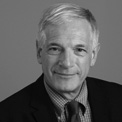PRESIDENT'S ESSAY

MacArthur Foundation Former President, Robert L. Gallucci
Contributing to a Stronger American Democracy
Electoral Reform
Over the last few years, MacArthur has explored ways to strengthen our democracy with leading thinkers and practical, on-the-ground actors.
We discussed the role of highly partisan primaries, gerrymandering of political districts, changes in campaign finance, how our elections are run, and how citizens are informed, among other issues.
We focused on a few – in particular, the role of money in campaigns and its ultimate impact on policymaking and our system of voting, particularly the right to vote and the modernization of voting systems.
To help provide information about campaign spending, we supported the Center for Responsive Politics and the National Institute on Money in State Politics; to provide legal expertise about campaign finance to states and localities, we supported the Brennan Center for Justice’s Democracy Program, the Campaign Legal Center, and Democracy 21; to encourage fresh perspectives, we made grants to the Committee for Economic Development, a business organization, and Justice at Stake, which works on how judicial campaigns are funded.
Over the last few years, MacArthur has explored ways to strengthen our democracy with leading thinkers and practical, on-the-ground actors.
Voting mechanics, voter registration, and access to the ballot were also serious concerns. We funded the Verified Voting Foundation to improve voting security, the Common Cause Education Fund and Advancement Project’s Voter Protection Program to promote fair election practices, and the Lawyers’ Committee for Civil Rights Under Law to help overcome obstacles to voting.
To promote more constructive discussion among members of Congress, we funded the Aspen Institute Congressional Program, which invites serving members from both parties to discuss policy issues with experts from think tanks and universities. We also provided support for the Congressional Research Service’s orientation, which brings freshman members of Congress together across party lines to learn about the issues they will confront as elected officials.
These contributions were aimed directly at political actors and the systems they operate in. The body politic, however, comprises all citizens.